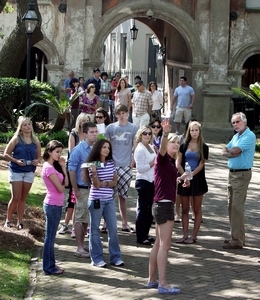
For media or press inquiries, contact:

When local leaders pitch the Lowcountry as a great place for business and industry, some of their most persuasive material comes from the area’s ivory towers.
The Medical University of South Carolina attracts some of the country’s best scientific minds to teach and do research, and its presence means better medical care for the region.
The College of Charleston and its graduates have enhanced the arts, provided an educated workforce and led the way in historic preservation.
The Citadel’s code of honor, duty and respect — and its engineering programs — have won recognition here and across the state.
Trident Technical College has one of the state’s largest nursing programs that is about to get a new building and get even larger.
And Charleston Southern University, a private, faith-based school, allows people to earn their degrees face-to-face and on-line.
Impressions of the Lowcountry usually include historic buildings, hospitality, beaches, arts or the port. But what bolsters each of those assets is the area’s institutions of higher education.
The Charleston region’s main colleges and universities do more than confer degrees and certificates. And the Charleston Regional Development Alliance thinks what they do is a story worth touting. So the organization, whose mission is to foster economic growth in the tri-county region, engaged an independent economic analysis and public policy consulting firm to measure the impact of colleges on the area.
It turns out that The Citadel, the College of Charleston the Medical University of South Carolina and Trident Technical College together inject $1.9 billion directly into the economy. When it is adjusted to reflect the actual economic impact, the total is $4.4 billion.
The colleges employ 41,197 people who earn $2.1 billion.
Charleston Southern University, which was assessed separately because it is a private school, while the others are state-supported, increases the impact by $141.7 million and 1,514 jobs.
But some of the benefits that come from being a “college town” aren’t so easy to measure. Representatives of those five colleges gave some examples at a presentation Thursday, and on today’s Commentary page.
Because of the colleges, the area gets a better workforce and less need for government assistance. (And we get better restaurants.)
Students perform community service, fill internships and bring energy and diversity to the area.
Colleges offer places for the community to hold events, and the public uses their libraries. Faculty members provide expertise in their fields, conduct research and raise the educational level of the population.
As MUSC President Ray Greenberg said, “There used to be a brain drain here. Now we have some of the best minds anywhere.”
All of the colleges are open to hearing what businesses are looking for in their employees, and they try to accommodate them. Charleston Southern is adding a masters in computer science. The Citadel is adding a mechanical engineering degree. Trident Tech works closely with Boeing and other industries to meet their workforce needs.
One problem locally has been limited employment opportunities for graduates, so preparing them for jobs makes sense.
The College of Charleston plays a key role in the Spoleto Festival USA. It contributes to historic preservation through academic programs and by restoring and maintaining historic buildings on campus.
(For future reference, CRDA should note that Charleston’s American College of the Building Arts is another educational linchpin in preservation.)
MUSC works with biomedical companies to help them locate here. Their work can save lives.
College events bring 135,000 out-of-town visitors every year.
And while this study was limited to the area’s five largest schools, College of Charleston President George Benson said there are 21 other colleges and universities (including the Charleston School of Law) with programs here.
David Ginn, CRDA president and CEO, said the colleges “play a fundamental role in attracting and producing highly educated, highly skilled talent, and are crucial strategic partners in building the region’s future as a globally competitive destination for business and talent.”
Local colleges are so much a part of the Lowcountry that it’s easy to take them for granted. The CRDA report gives ample reasons we shouldn’t — starting with 4.4 billion to be specific.
[email protected] or call us at +1 843.767.9300